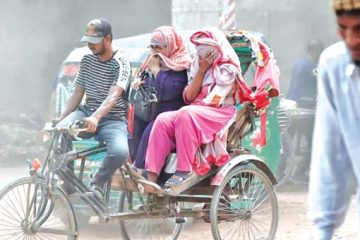Sadeq Khan
The representative government of Sheikh Hasina, brought to power by a landslide election victory of its grand alliance at the end of two years of emergency rule, is not yet faced with any serious civic challenge to its lackadaisical style of governance. The Prime Minister enjoys blind loyalty of a countrywide network of activist following, albeit factional feuding over sharing of spoils.
She has an overwhelming majority in the parliament capable of recasting the Constitution in her desired mould, albeit on pain of confirmation by a referendum if such recasting involves structural changes of the Supreme Law. Yet the nervousness that her government is exhibiting by lack of faith in her administrative machinery (as evidenced by frequent transfers and vacancies in posts of executive and plenipotentiary status) is rendering her grip on state power impotent in performance.
Policy coherence is yet to be mustered by her cabinet team, and doctrinaire policy implementation appears to have overburdened her team’s capacity, apart from being of feeble public interest under awesome conditions of poor living (electricity failure, water shortage, unemployment). Her garrulous ministers often contradict one another (like one saying India’s Tipaimukh barrage may provide welcome help for Bangladesh by hydro-electric supply, another joining the public chorus of protest anticipating the immense harm to our Surma-Kushiyara-Meghna river system and our ecological balance from the upstream intervention).
Chaotic rent seeking
Development programmes of the government are in a quandary, and over rent-seeking in social security programmes and handouts (Food for Work, Vulnerable Group Feeding, Test Relief), the empowered local MP, the subordinated Upozilla and Union Council Chairmen and Councillors, the local mobs of party activists of MP faction and Chairman faction, and the UNO’s remain in a state of flux from shifting loyalties and a tug of war for plunder. Post-election violence of settling scores with political opponents continue, and has extended to witch-hunts about naming well-to-do innocents as “Islamic militants” or “war-criminals”.
Protection rackets with willing cooperation of local police is going on, charging underhand payments for crossing the names of gullible victims off the lists of jangi (terrorist) or juddhaporadhi (war-criminal) suspects. After the BDR mutiny, surveillance in the borders of Bangladesh has been deplorably weakened. Criminal godfathers of armed gangs have resurfaced from their hide-outs in the country and returned from their safe havens across the border to engage in a field day of violent crimes and expand their respective turfs all over the country. Indeed it is the breakdown of law and order, and the insecurity of life and property that is terribly unsettling for the common citizen, whether living in a city, a small town or in a rural area. The economy is also beginning to show strains under global recession, notwithstanding its resilience on account of simplicity of its basket of products, internal and external trade, manpower deployment and financial instruments. Exports are falling and factories are closing down. A staggering spectacle of social, economic and political adversity may be piling up fast to challenge the incumbent flippant rulers of the nation-state.
Ministers’ flippancy
The height of flippancy and insensitivity of some ministers of Sheikh Hasina’s cabinet and some office-holders of ruling Awami league is exemplified by the way they reacted to press reports on the report of the army court of enquiry investigating the BDR mutiny. That is the only report that was completed within the stipulated time-frame and submitted to the army chief to be forwarded to our Defence minister and Prime Minister Sheikh Hasina. Twenty army officers who were members of the court of enquiry are all oath-bound not to divulge their findings to the media or to anyone other than their military colleagues and superiors.
Diligent investigative reporters, however, managed, like in other cases of sensitive investigations by the CID, to obtain an executive summary of the report of the military court of enquiry, possibly from the Prime Minister’s Office or from the Army Headquarters. Several newspapers published more or less similar versions of main findings of that report, mentioning also that the court of enquiry had to prepare it in accordance with its terms of reference and therefore did not include many relevant matters that came to the court’s knowledge in course of investigations. It was beyond its jurisdiction also to extend investigation to pursue such clues, and therefore the court of enquiry recommended a high-level judicial enquiry to be instituted to get to the bottom of the mystery behind those clues and expose possible masterminds behind the mutiny.
For some odd reason that defies common sense, the LGRD minister of the ruling cabinet and also the spokesman of the Awami League Syed Ashraful Islam chose to strike a confrontational posture to denounce the report of the Army Court of Enquiry on BDR mutiny, based not on the report itself as available with the Prime Minister who is the boss of the armed forces, but on media reports. On May 17 at a meeting of activists of Awami Youth League, a wing or “associate” organisation of his party, the Awami League spokesman questioned the quality of the investigation report of the army on the February 25-26 rebellion at the Bangladesh Rifles headquarters in Dhaka, saying that the report carried by the press, if true, seemed to be motivated and “an attempt to hide the truth”: “it appears from news reports carried by a section of the press that the army probe committee’s report on the BDR rebellion is incomplete and an attempt to put up a smokescreen in order to hide the truth about the tragedy.”
He complained that the report did not mention who were the perpetrators, who could be the beneficiaries and what was their motive. The report also avoids mentioning who had helped the BDR soldiers flee by boats: “There is nothing in the report about what might have happened had the army gone into action at Peelkhana to quell the rebellion and what the situation would have been at the border outposts. The report is silent about the fact that the country was on the brink of a civil war following the carnage.”
Minister’s conjectures
The LGRD minister apparently wanted his own conjectures as above to be included in the report of the Army Court of Enquiry. He also forgot that Court of Enquiry report itself said that it was limited by its terms of reference, and a broader, high-powered enquiry was needed for satisfactory completion of the investigation. What is more troubling is that the LGRD minister chose to denounce the government’s own army, which submits to the command of the head of government, absolutely unprovoked and without any sign of command failure. What he said further was even more intriguing: “Times are not good. You [party activists] must begin preparing yourselves for all possible contingencies.” Why this message of doom? Does this not add to the sense of insecurity and uncertainty amongst the people?
In the same meeting Agriculture Minister and Awami League presidium member Matia Chowdhury alleged: “A vested quarter is trying to implicate some leaders of Awami League and Juba League in the [BDR] incident by spreading falsehood but the people have rejected their claims as Sheikh Hasina’s capable and farsighted leadership in tackling the situation has been hailed nationally and internationally.”
She also referred to indirect circumstantial evidence which she said showed there were militant links to the Peelkhana carnage. She questioned why the court of enquiry report failed to mention about the implication of coloured scarves worn by some mutineers, and asked who were the people who, with ash yellow and orange-coloured handkerchiefs tied around their mouths, were active inside the BDR headquarters during the carnage. The colours are usually used by a particular militant outfit, she said and urged party leaders and activists to guard against conspiracies against the government.
Terms of reference
Evidently, such political conjectures were not the subject of the military court of enquiry and its terms of reference. Why then this outburst of fiery denouncements of the army court of enquiry, when the report of the Combined Enquiry Committee formed by the government under the aegis of the Home Ministry is being still awaited after missing four (indeed five) deadlines for submission? Is it that the ministers are afraid, not of a reshuffle, but of their collective failure in performance, and of a consequence, as spelled out in the U.S. based Freedom House report on Bangladesh situation: “Sheikh Hasina’s government needs to move quickly to fulfil its duties and gain the public’s confidence, or there is a strong possibility that the military will retake control.”







